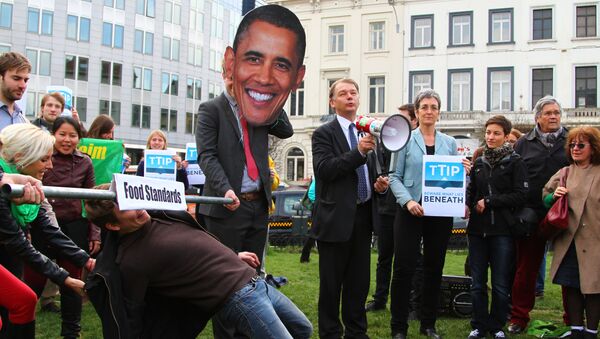The so-called ‘fast-track' legislation limits Congress' ability to tweak the opaque details of Obama's trade deals with East Asia and the EU, allowing them to vote only yes or no on the entire package as a whole. The Administration is urging Congress to push the bill through so that the President can supposedly be in a stronger position to negotiate with his foreign counterparts. The real reason for the hurried rush, however, is that the US wants to jam the secretive trade package through before the election season heats up next year, and also before the EU public wakes up to the fact that the Trans-Atlantic Trade and Investment Partnership (TTIP) is in fact a very unbalanced and neo-colonial deal for the continent.
Submissive Reality
It's for self-interested reasons that European politicians are deflecting talk about TTIP's details, since if they reached mainstream attention, then the public would likely revolt against them, protest in the street, and perhaps even stage an ‘Occupy' movement in Brussels or their national capitals. From the information that's been leaked so far, TTIP will extend American economic jurisprudence over the EU, thereby making it impossible for the bloc to conduct any future trade deals without America's stamp of approval (more on this later). The formal cost of admission to this submissive relationship is social sadism, since the EU will have to lower its own quality and safety standards to US levels and therefore decrease the high quality of life that its citizens currently enjoy. This ‘standards balancing' is really nothing more than a backdoor for the US to thrust its GMOs upon the European population and begin the takeover of the continent's entire agricultural sector.
On the political level, TTIP would mandate that European products simply be marked "Made in EU", which would continue Brussels' destructive policy of dismantling national identity and diluting the individual contribution of its member states. Alarmingly, these very same member states may actually find themselves subordinated to a slew of transnational corporations (TNCs), which under TTIP, would gain the right to sue national governments if they feel their corporate privileges are being impeded by the authorities. In the US, a corporation is already recognized as a ‘person', so TTIP basically builds upon this ‘standard', takes it to the level of state equivalence, and then forces this concept upon the EU. In all likelihood, this will lead to the most ambitious TNCs (either US- or EU-affiliated, or acting independently) overpowering the governments of smaller member states and ushering in a formal corporatocracy.
Geopolitical Overlap
TTIP isn't all about economics, since it reflects the US' ambition to pursue a full-spectrum envelopment of the EU. It's an unstated fact that the EU is politically submissive to the US, and NATO represents the US' mechanism of military control over the continent. The only remaining sphere of relative (key word) freedom lies in economics, and it's the only possible way that the EU can find a way to liberate itself from American control. If the EU can trade with Russia and China independent of US pressure, then it could strengthen its sovereignty and begin to assert whatever political and military interests it may have that don't necessarily coincide with America's Eurasian vision. On the other hand, if the EU's economic policy is subordinated to American decision makers, then it loses the greatest and most realistic prospect that it has to ever become an independent actor in global affairs.
Target: China
The US has other ideas in mind, however. It would like to cut China out of the framework as much as possible, and instead substitute the world's largest economy with a plethora of East Asian states centered on the Trans-Pacific Partnership (TPP). If all goes according to design and both TTIP and TPP enter into effect, then the US would become the middleman in managing European-East Asian trade, thus propelling it into the coveted global position that the British held in the19th and early 20th centuries. The US plans to take it even further, though, and expand its network of economic alliances to all corners of the world. Through a constellation of trade agreements, it already has free trade with all of Central America (barring Belize) and the countries of the Pacific Alliance trade bloc. If it can group them all together under a unified organization, then it could add a third key element to its global economic apparatus; Latin America.
The power that would come from simultaneously multi-managing three major trade blocs (EU, East Asia, and half of Latin America) would enable the US to put enormous pressure on Mercosur, the final Western Hemisphere holdout centered on BRICS member Brazil. It could also lead to the US manipulating each of its affiliated blocs' trade relations with India in order to later bring it into the fold, too. Looking at Africa, it can continue to exploit the African Growth and Opportunity Act to pick and choose yearly candidates for de-facto free trade privileges (dependent on unipolar loyalty, of course). The end game, as it is with each of the US' other controlled trade blocs, is to complicate China's economic relations with its partners, put the brakes on its growth, and set the stage for domestic destabilization in the heart of America's latest global rival.




